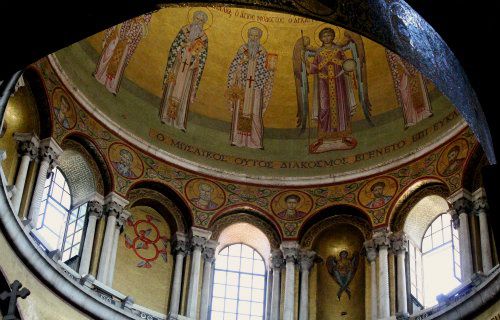In a declaration delivered at the end of a private meeting, Pope Francis and the Ecumenical Patriarch of Costantinople Bartholomew I marked a new step on the journey towards unity, stressing their commonality in areas such as respect for the sanctity of life and the protection of the family. Pope Francis and Patriarch Bartholomew met in Mount Scopus, Jerusalem on May 25 during the pontiff's current three-day visit to the region. The two signed a common declaration after a private meeting and an exchange of gifts, and then held an ecumenical celebration in the Basilica of the Holy Sepulchre in Jerusalem. The meeting between the Pope and Patriarch marks the 50th anniversary of the meeting between Paul VI and the then Patriarch Athenagoras in Jerusalem Jan. 6 1964, which concluded with the historical embrace between the two. Pope Francis and the Patriarch Bartholomew wanted to commemorate that historical meeting again in Jerusalem, thus pushing to foster the ecumenical path toward the Unity of Christians. “Our fraternal encounter today is a new and necessary step on the journey toward the unity to which only the Holy Spirit can lead us, that of communion in legitimate diversity,” the common declaration read. Pope Francis and the Patriarch Bartholomew declared to look forward “in eager anticipation to the day in which we will finally partake together in the Eucharistic banquet,” and that Christians are “preparing to receive this gift of Eucharistic communion” through “the confession of the one faith, persevering prayer, inner conversion, renewal of life and fraternal dialogue.” The Pope and the Patriarch underscored the “substantial progress” of the theological encounters which took place under the predecessors St. John Paul II, Benedict XVI and Patriarch Dimitrios. The theological dialogue “does not seek a theological lowest common denominator on which to reach a compromise, but is rather about deepening one’s grasp of the whole truth that Christ has given to his Church,” the common declaration said. “Our faithfulness to the Lord demands fraternal encounter and true dialogue,” a common pursuit that does not “lead us away from the truth,” but “rather, through an exchange of gifts, it will lead us into all truth,” the Pope and the Patriarch stressed. The common declaration provided the fields in which the Catholic Church and the Ecumenical Patriarchate may work together in the service of humanity. The common fields are: the defense of the dignity of the human person at every stage of life an the sanctity of family based on marriage; the promotion of peace and the common good; the response to the suffering that afflict the world. “We acknowledge that hunger, poverty, illiteracy, the inequitable distribution of resources must constantly be addressed,” and “it is our duty to seek to build together a just and humane society in which no one feels excluded or emarginated,” the Pope and the Patriarch declared. The Pope and the Patriarch also announced their common commitment for the safeguard of the creation, acknowledging “in repentance the wrongful mistreatment of our planet, which is tantamount to sin before before the eyes of God.” “We reaffirm our responsibility and obligation to foster a sense of humility and moderation so that all may feel the need to respect creation and to safeguard it with care,” the Common declaration reads. Pope Francis and Patriarch Bartholomew also urged an “effective cooperation of Christians in order to safeguard everywhere the right to express publicly one’s faith and to be treated fairly when prompting that which Christianity continues to offer to contemporary society.” While inviting to the promotion of “authentic dialogue” with Judaism, Islam and other religious tradition, the Pope and the Patriarch expressed “profound concern” for the situation of the Christian in Middle East and “for their right to remain full citizens of their homelands.” The Roman Pontiff and the Patriarch of Constantinople especially prayed for the Churches in Egypt, Syria and Iraq, and encouraged “all parties, regardless their religious convictions, to continue to work for the reconciliation and for the just recognition of people’s rights.” “We are persuaded that it is not arms, but dialogue, pardon and reconciliation that are the only possible means to achieve peace,” the common declaration read. For this purpose, the Pope and the Patriarch stressed that “it is precisely through our common witness to the good news of the Gospel that we may be able to help the people of our time to rediscover the way that leads to truth, justice and peace.”

